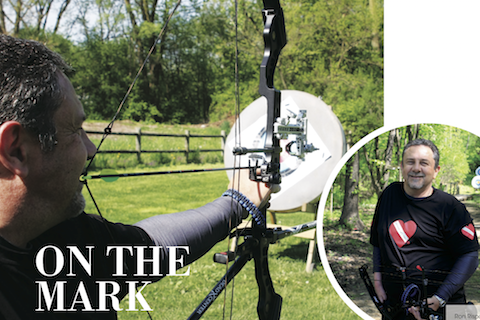
Diveheart
Hinsdale Magazine, June 2019
Diveheart recreational therapist Ron Rispoli eyes 2020 Paralympic Games in Tokyo
Each month Diveheart Organization spotlights incredible volunteers in Hinsdale Magazine.

By joining the Diveheart team, you will become part of one of the most innovative nonprofits in the diving world. Diveheart relies on the participation and donations of people like you to support our adaptive diver programs. Your involvement is valuable regardless of whether you are on the surface, underwater or just spreading the word. Please support Diveheart, share the Diveheart story, and come join us at an event. We are about you!
As a recreational therapist, what benefits to yo see specifically from scuba therapy for your students?
Any activity can have therapeutic benefits, as it is based on each individual person and their perceived mastery of the activity. What I believe sets scuba diving apart from many/most activities is that, 1. most people with or without a disability do not participate in the sport. Only one percent of the world’s population scuba-dives. Right there, the diver with the disability is participating in an activity that 99 percent of the world does not. 2. Unlike land-based sports and activities, scuba- diving allows for weightlessness to take over. For most of my students who have grown up sitting in a wheelchair, they are constricted by the laws of nature, meaning gravity takes over. Most of them have to use wheelchairs or walkers to ambulate. They have limited or no ability to use their legs. And depending on the disability, they may have limited or no movement of their arms as well. Scuba-diving allows these same individuals to get free from their wheelchairs or walkers, and experience a gravity-free environment. They get to float underwater, and very often see their legs and arms move freely for the first time.
I previously mentioned the phrase “perceived mastery.” If you or anyone perceives that they are good at something, especially something that they enjoy doing, you or they will continue to do it. So if someone enjoys scuba-diving, they will continue to do it. And they will become more skilled as well. This perceived mastery only increases their self-worth and self-esteem. It also encourages them to try to do more. I can honestly tell you that I had a very shy student, who in high school P.E. class was told to sit on the sidelines and cheer the others on. After getting involved in scuba-diving, this “shy” student has ventured out of her comfort zone, and has gone on to get involved in more activities. In addition to diving, she is the lead volunteer at her local hospital for the past five years.
What are the parallels between archery and scuba, if any?
The parallels between adapted archery and adapted scuba, better yet archery and scuba, is that with some adaptations or modifications, almost anyone can participate in either sport. And this goes for most sports in general. With a little tinkering here or there, every sport can be made accessible to anyone with a disability. Diveheart has trained a young lady with no arms to be a scuba diver. One of the best Paralympian archers that I know also has no arms and shoots his bow using his feet. If there is a will, there is a way! As I previously stated I grew up playing able-bodied sports.
I did not use or did not need any adaptations…until I took up archery. And with one small adaptation, mouth tab attached to my bow string, I am now shooting with my contemporaries. I only wish that I would have done this sooner. I am currently shooting with some of the best adapted archery shooters in the world. My goal was to compete in the 2020 Paralympic Games in Tokyo, Japan next year, but as I said, I’m shooting with some of the best archers in the world. I have learned that there is still more work to be done. My goal as a Diveheart Board Member and volunteer, my goal as a person with a disability, is to educate others and let them know that they don’t have to sit on the sidelines and cheer others on, that with some slight modifications that they too can participate in scuba diving, or any activity that they choose.
Read the complete Hinsdale Magazine article (pages 62-63)
Download a PDF file of this article
